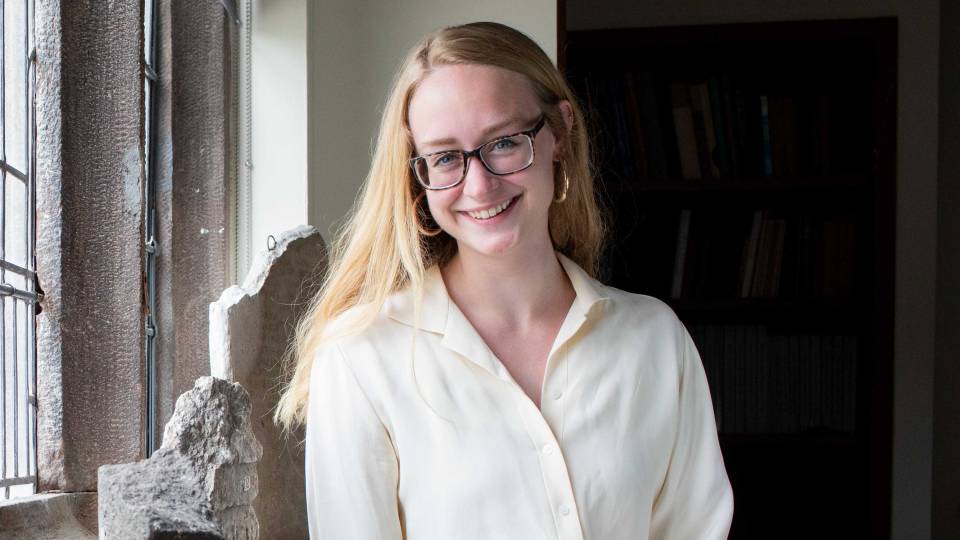From a young age, Dan-el Padilla Peralta viewed the study of ancient
civilizations as the foundation of his path to a better future.
When
Padilla was 8, living with his family in a shelter in New York’s
Chinatown, he came across a copy of a guidebook to ancient Athens and
Rome. He was fascinated by maps of the cities and by images of the
Parthenon, togas and other symbols of a time and place so far removed
from the impoverished neighborhoods where he was raised.
The book spurred an interest in the study of classics(Link is external)
-- and of the pursuit of education in general -- that eventually led
Padilla to Princeton, where his many academic achievements have
culminated in his selection as salutatorian of the class of 2006.
Padilla will continue the University’s tradition of delivering a speech
in Latin at the June 6 Commencement(Link is external) ceremony.
Padilla
used education as a way to escape his difficult surroundings. He became
involved with Prep for Prep, a New York-based program that identifies
and supports talented students from minority backgrounds, and attended
the Collegiate School, where he delved into the study of Latin and
Greek.
Padilla visited Princeton while participating in high
school debate tournaments held on campus and attended the University’s
annual Humanities Symposium for prospective undergraduates in October
of his senior year. He decided to apply to Princeton because of the
“openness with which people here participated in intellectual pursuits.”
“I
came from a school where the currency for socializing was this
intellectual drive that everyone seemed to share. Princeton, I thought,
was the most appropriate place to take that to the next level,” Padilla
said.
Although he came to Princeton intending to major in
classics, he did consider concentrating in other departments,
particularly molecular biology. But two early interactions with
classics faculty members helped convince him to stick with his original
plan.
In his first day of classes as a freshman, Padilla sat in
on associate professor Andrew Feldherr’s course on “Invective, Slander
and Insult in Latin Literature” and was struck when Feldherr approached
him after the class to urge him to explore the department’s offerings.
“That definitely stood out as something that really encouraged me to
study classics, but in a broader sense to seek out and talk to faculty
here,” Padilla said.
As a sophomore, Padilla sent a “timid
e-mail” to assistant professor Joshua Katz inquiring about the
possibility of taking his graduate seminar, “Historical/Comparative
Grammar of Latin.” Katz welcomed Padilla into the course, and his
experience there “cemented my desire to study classics,” he said.
Padilla
wound up taking several graduate courses in the department, impressing
faculty members with his breadth of knowledge, intellectual curiosity
and enthusiasm.
“He has a supple and inquiring intelligence,
with an uncanny knack for sifting out the important secondary
literature from the humdrum, and for spotting what really counts in any
debate,” said Denis Feeney, chair of the classics department, who
taught Padilla in both undergraduate and graduate courses. “He is a
highly gifted linguist and critic, with a phenomenal amount of
independence and motivation. Above all, as with all truly outstanding
students, he really loves the material and is driven to master it.”
Padilla’s
initiative was exemplified by his senior thesis, in which he examined
four Roman stones owned by the University, republishing the epitaphs
carved upon them and researching their historical and social context,
paleography and iconography. He also conducted a scientific analysis of
the marble’s composition and origins. The project culminated in a
two-week exhibition at Firestone Library, which Padilla called “one of
the highlights of my Princeton experience.”
“It was his idea to
do the scientific analysis of the stones in addition to the
epigraphical analysis of the texts,” said Harriet Flower, associate
professor of classics and Padilla’s senior thesis adviser, who expects
that his thesis research will be published. “Somebody else could have
written a senior thesis quite easily just about the text. … A lot of
people don’t even see the possibility that you could combine what
you’ve learned in a science class with what you’ve learned in a
classics class.”
In addition to his unique classics thesis,
Padilla wrote a thesis for the Woodrow Wilson School of Public and
International Affairs, where he is a certificate candidate, on
socioeconomic integration in school districts with a history of
court-supervised desegregation.
“Dan-el can cut through a
great deal of information and focus quickly on the important points,”
said Nathan Scovronick, a lecturer in the Wilson School and Padilla’s
thesis adviser there. “He is able to weigh both the practical and the
moral implications of a policy issue. He always keeps in mind that
policy-making is not an abstract exercise, that it affects the lives of
real people.”
Padilla’s work in the Wilson School is an
extension of his commitment to educational issues. He has served as a
counselor and program leader for Prep for Prep and continues to
interview prospective students for the program. As he plans his own
career as a classics scholar at the university level, Padilla intends
to advocate for reforms that will help provide better access to
education in America and to encourage more minority students to pursue
studies in the humanities.
After graduation, Padilla will head to Oxford University to read for a second bachelor’s degree in classics, supported by the Daniel M. Sachs Class of 1960 Graduating Scholarship(Link is external),
one of the highest honors given to Princeton undergraduates. It is
among many awards he has earned at Princeton, including the Freshman
First Honor Prize, the Shapiro Prize for Academic Excellence and the
Van de Velde Prize for Junior Independent Work in the Wilson School.
Both
Feeney and Flower said they expect Padilla to become a major figure in
the classics field in a short time. According to Feeney, “He has
everything it takes to succeed -- sheer talent, capacity for
self-motivated hard work and a passion for the subject.”



